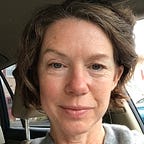Why do you look yellow?
“Why do you look yellow?” My mother squints at me from six feet away. “I don’t know…” I answer. I’m stumbling here. She really wants to know why I look yellow. I don’t think I look yellow. And I don’t want to talk about how I look. Her past comments on my looks still sting. Two old favorites are, “Your hair wouldn’t have those clumps in if you brushed it” and “That shirt would look nice ironed.”
Then there was the gasp she released one day when she eyed the photo of me fully made-up for my engagement party. “Now there you are.” Unpack that statement. There’s the there and there’s the you. And what about the declarative now? Here I am now, sitting next to you, here on the couch and you are visiting me and my husband and my one-year-old. Isn’t this the now to celebrate, even with my dirty jeans and old Danskos and, yes, probably hair clumps?
I want to respond, to let her know it hurt. We leave the house for a walk up the sandy shoulder of my rural road. My mother pushes my son’s stroller with her typical haste, an internal setting that drives her even today in her mid-eighties. I follow, arms flailing with a weightlessness — they feel insubstantial without the burden of a shifting child or toys to toss, food to prepare. As if underwater my limbs dig at the sky and the trees as I try to get my mother to see me here, not there, not there you are in eye pencil and sticky mascara, but here. Does she have a preferred version of me? Does she think of that woman in the photo as the real me?
Nearly twenty years pass. My son rides out the pandemic in the Southwest and practices Spanish with a teacher in Peru. At sixteen, my daughter is having her first serious relationship. She wears a mask at home with me and my husband so she can see the boyfriend while keeping us safe.
In 2017, my mother received a mixed diagnosis of Alzheimer’s and vascular dementia. The physical isolation the pandemic foists upon her shrinks her life to a point at which her living of her life barely perceptible. Yes, she’s safe and well-cared for at her place. Diligent workers offer activities: exercise, art, word games. She’s glad to do it because she doesn’t know what else to do. Dementia cheats people by somehow making it hard for them to start things, to initiate. Take a walk, write a letter, read The Times, do what you’ve always done, things that make you you, things that make life, Life.
After my mother left that day my husband and I study the picture of me looking hot in velvet and blown out hair, tooting a noise maker. “I like you both ways,” he says. Swoon. Shouldn’t that have satisfied me? I could only hear my mother’s “Why do you look yellow?” as a criticism. “Maybe she has cataracts,” suggests a good friend of mine. “Older folks see things more yellow, of course, until they get their cataract surgery.” My friend is rational and compassionate, a stark contrast to my self-involvement. I don’t understand that my mother is trying to make sense of a world that looks less and less familiar. She’s concerned not that I don’t look my best but that I not appear the color of a crayon or a party napkin.
